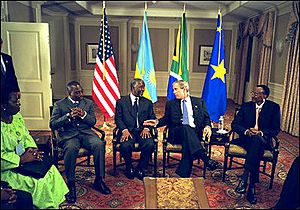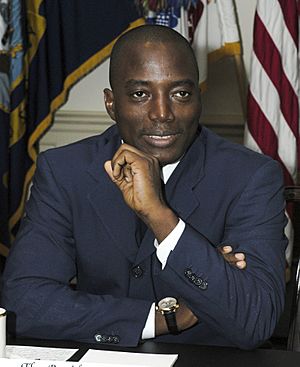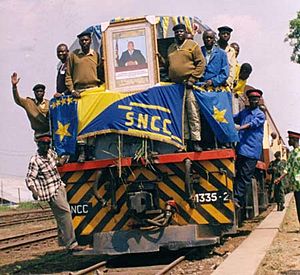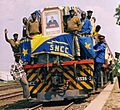Joseph Kabila facts for kids
Quick facts for kids
Joseph Kabila
|
|
|---|---|
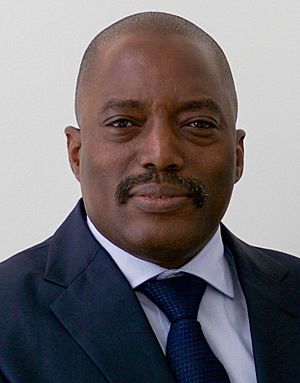
Kabila in 2016
|
|
| 4th President of the Democratic Republic of the Congo | |
| In office 17 January 2001 –
|
|
| Prime Minister |
See list
Antoine Gizenga
Adolphe Muzito Louis Alphonse Koyagialo (acting) Matata Ponyo Mapon Samy Badibanga Bruno Tshibala |
|
See list
|
| Preceded by | Laurent-Désiré Kabila |
| Succeeded by | Félix Tshisekedi |
| Senator for life | |
| Assumed office 15 March 2019 |
|
| Personal details | |
| Born |
Joseph Kabila Kabange
4 June 1971
|
| Political party | People's Party for Reconstruction and Democracy |
| Spouse |
Olive Lembe di Sita
(m. 2006) |
| Alma mater |
|
| Military service | |
| Allegiance | |
| Branch/service | Armed Forces of the Democratic Republic of the Congo |
| Rank | Major-general |
Joseph Kabila Kabange (born 4 June 1971) is a politician and former military officer from the Democratic Republic of the Congo (DRC). He served as the fourth President of the DRC from 2001 to 2019.
Joseph Kabila became president after his father, President Laurent-Désiré Kabila, passed away in 2001. This happened during the Second Congo War. He later founded the People's Party for Reconstruction and Democracy (PPRD) in 2002. After the war ended in 2003, he led the country's new transitional government. He was elected president in 2006 and again in 2011. After leaving office in 2019, Kabila became a senator for life, a special role for former presidents. He was the second-longest serving president in the DRC's history.
Kabila is recognized for helping to end the Second Congo War and bringing some peace to most of the country. However, some conflicts continued in the eastern part of the DRC. During his time as president, he encouraged foreign companies to invest in mining and worked to improve the country's roads and buildings. The size of the country's economy grew significantly. However, economic growth slowed down later, and many people in the DRC still lived in poverty when he left office. He helped set up election systems and oversaw the DRC's first multi-party election in many years in 2006. His elections in 2006 and 2011 faced questions about fairness and led to protests. His government also faced criticism regarding how it was run and concerns about human rights.
Kabila's term was supposed to end in December 2016. Elections were planned, but they were delayed until early 2018. This led to a decline in his popularity and increased pressure from other countries. An agreement was made with the Catholic Church to form a new government and prepare for elections. In August 2018, Kabila announced he would not seek a third term. Félix Tshisekedi became president after the 2018 election, marking the country's first peaceful transfer of power since it became independent.
Contents
- Early Life and Education (1971–1996)
- Military Career and Rise to Power (1996–2001)
- Peace Efforts and Transitional Government (2001–2006)
- First Presidential Term (2006–2011)
- Second Presidential Term (2011–2016)
- Extended Presidency and Transition (2016–2019)
- After the Presidency (2019–Present)
- Personal Life
- Images for kids
- See also
Early Life and Education (1971–1996)
Joseph Kabila Kabange and his twin sister Jaynet Kabila were born on 4 June 1971. They were born in Hewa Bora II, a village in the Maquis of Fizi, located in what is now South Kivu Province in eastern DRC. There were some discussions about whether he was born in Tanzania. His parents were Laurent-Désiré Kabila, a long-time rebel leader who later became president, and Sifa Mahanya.
Joseph Kabila grew up in a quiet area. He went to a primary school set up by his father's rebel group. Later, he moved to Tanzania for primary and secondary school. Because his father was an opponent of Zaire's leader Mobutu Sese Seko, Joseph pretended to be Tanzanian during his school years to avoid being discovered.
Military Career and Rise to Power (1996–2001)
After finishing high school, Kabila received military training in Tanzania and then at Makerere University in Uganda. In October 1996, his father, Laurent-Désiré Kabila, started a campaign in Zaire to remove the Mobutu government. This campaign was known as the First Congo War. Joseph Kabila became a commander in his father's army, the Alliance of Democratic Forces for the Liberation of Congo-Zaire (AFDL). He likely played an important role in major battles.
After the AFDL won and his father became president, Joseph Kabila received more training at the PLA National Defense University in Beijing, China.
When he returned from China, Kabila was promoted to major-general. In 1998, he was made Deputy Chief of Staff of the Congolese Armed Forces (FAC). In 2000, he became Chief of Staff of the Land Forces. He held this position until his father passed away in January 2001. As chief of staff, he was one of the main military leaders during the Second Congo War (1998–2003).
Peace Efforts and Transitional Government (2001–2006)
Joseph Kabila became president on 26 January 2001, after his father's death. At 29 years old, he was seen as young and not very experienced. Reports suggested he didn't initially want to be president, but he was the only person his father's advisors could agree on. In his first speech, Joseph Kabila talked about bringing peace back to the country, restarting negotiations, moving towards democracy, and improving the economy.
He then tried to end the ongoing civil war by talking with rebel groups. These groups were supported by neighboring Rwanda and Uganda. The peace process began in 2001 and continued despite difficulties and renewed fighting. With international help, a final peace agreement was reached in 2002 in Sun City, South Africa. This agreement officially ended the Second Congo War. It allowed Joseph Kabila to remain president and head of state. A transitional government was formed under him. It included leaders from the main rebel groups as vice-presidents, along with representatives from other political groups. The plan also set up a new parliament and armed forces, and elections were to be held within two years.
The peace agreement was put into action with international monitoring, including a large United Nations peacekeeping mission. The first government cabinet was formed in June 2003. The Independent Electoral Commission (CEI) was created in 2004. In February 2005, the parliament began working on a new constitution. It was approved by voters in a referendum at the end of 2005, with 84 percent of people voting yes. Kabila officially announced the new constitution in February 2006.
Creating the Armed Forces of the Democratic Republic of the Congo (FARDC) by combining government troops and rebel groups was a slower process. Kabila also set up his own special presidential guard, which received better pay and equipment than the regular army.
In March 2004, an attempt to take power near the capital Kinshasa failed. Another attempt in June 2004, led by Major Eric Lenge, was also stopped by loyal troops.
In October 2004, Kabila visited the eastern part of the DRC for the first time since the war ended. This visit showed that stability and unity were returning to the country. This trip was also seen as the start of his election campaign. Kabila's campaign promised a reconstruction plan called Cinq Chantiers (Five Construction Sites). This plan focused on improving infrastructure, creating jobs, education, water and electricity, and health.
First Presidential Term (2006–2011)
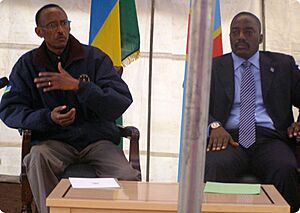
Kabila ran for president as an independent candidate. His campaign was supported by the Alliance of the Presidential Majority, which included his People's Party for Reconstruction and Democracy (PPRD) and about 30 other parties. During the election, some opponents claimed he was Rwandan, which was a sensitive issue in the country. However, Western observers still saw Kabila as the likely winner because the political opposition was divided.
A presidential election was held on 30 July 2006. The new constitution allowed candidates to be 30 years old, and Kabila had just turned 35. After the first round, Kabila won 45% of the vote, and his main opponent, Jean-Pierre Bemba, won 20%. Because no one won more than 50%, a second round of voting was held on 29 October. On 15 November, Kabila was declared the winner with 58.05% of the vote. These results were confirmed, and Kabila was sworn in on 6 December 2006. Both international and national observers said the election was generally fair, despite some issues. He appointed Antoine Gizenga as prime minister.
A major economic project during his first presidency was the Sicomines agreement with China. This deal was about "resources-for-infrastructure." The DRC signed an agreement in September 2007. It gave a Chinese company consortium most of the shares in a joint mining company called Sicomines. In return, the Chinese company agreed to build infrastructure in the DRC and secure US$6.5 billion from Chinese banks to pay for it. This was the first time China became a major partner for the DRC and was the largest deal of its kind.
The agreement was discussed a lot because the DRC government guaranteed the loans, meaning they took on the risk. After concerns from the IMF and other groups, the final deal was signed in 2009. The infrastructure investment was reduced to US$3 billion. Kabila faced some criticism for the deal, with some saying it wasn't transparent enough or fair to Congo. However, his government argued that the DRC still benefited from the investments.
Second Presidential Term (2011–2016)
In December 2011, Kabila was re-elected for a second term as president. After the results were announced, there was some unrest in Kinshasa and Mbuji-Mayi. Observers from the Carter Center reported that results from many polling stations were missing, especially in areas where the opposition candidate Étienne Tshisekedi had strong support. They said the election lacked credibility. Kabila was sworn in on 20 December, promising to invest in infrastructure and public services.
On 17 January 2015, Congo's parliament passed a law that would require a census before the next elections. This led to protests starting on 19 January. The protests began because people worried this law would allow Kabila to stay in power longer than his term. The Senate later removed the census requirement from the law.
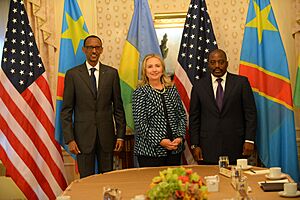
Jaynet Kabila, Joseph Kabila's sister, was mentioned in the Panama Papers. These leaked documents in 2016 showed that she partly owned a major Congolese television company through offshore companies.
Kabila faced declining popularity. This was partly due to ongoing conflicts in the Congo and concerns that he and his family had become wealthy while many Congolese remained poor. There were protests against his attempts to change term limits and extend his time in office.
Extended Presidency and Transition (2016–2019)
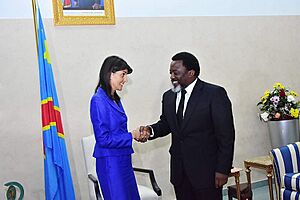
According to the Constitution of the Democratic Republic of the Congo, a president can only serve two terms. On 19 September 2016, large protests took place in Kinshasa, calling for Kabila to step down as required by law. Elections to choose a new president were originally set for 27 November 2016. However, on 29 September 2016, the electoral authority announced that the election would not happen until early 2018. The opposition believed Kabila was intentionally delaying the election to stay in power.
In response to the delayed election, the United States placed actions against two of Kabila's close associates. These actions were seen as a warning to President Kabila to respect his country's constitution.
Kabila's second term as president was supposed to end on 20 December 2016. On 19 December 2016, his spokesperson stated that Joseph Kabila would remain in office until a new president was in place after elections, which would not be held until at least April 2018. Kabila then appointed a new government led by Prime Minister Samy Badibanga. This led to more protests.
On 23 December, an agreement was proposed between the main opposition group and Kabila's government. Under this agreement, Kabila agreed not to change the constitution and to leave office before the end of 2017. The opposition leader Étienne Tshisekedi was to oversee the agreement, and the country's Prime Minister would be chosen by the opposition.
In late February 2018, Botswana's international affairs ministry urged Kabila to step down, citing the "worsening humanitarian situation" and his delays in holding elections.
On 30 December 2018, the presidential election was held to choose Kabila's successor. Kabila supported Emmanuel Ramazani Shadary, his former interior minister. On 10 January 2019, the electoral commission announced opposition candidate Félix Tshisekedi as the winner.
After the Presidency (2019–Present)
Since leaving the presidency, Kabila has mainly lived at his Kingakati farm, located east of Kinshasa. This estate was his second home while he was president.
In April 2021, President Felix Tshisekedi removed the remaining members of his government who were loyal to former leader Kabila.
In May 2021, Tshisekedi called for a review of mining contracts that Kabila had signed with China, especially the Sicomines "minerals-for-infrastructure" deal.
In November 2021, a legal investigation began in Kinshasa concerning Kabila and his associates. This followed reports of alleged misuse of $138 million. A Bloomberg News investigation, based on leaked bank records, claimed that Kabila's family members received large sums of money from Chinese companies involved in the Sicomines deal.
In February 2025, Kabila criticized President Tshisekedi for how he handled the M23 conflict. He accused Tshisekedi of trying to become an "absolute ruler" by stopping political opposition. Tshisekedi, in turn, accused Kabila of supporting the M23 rebels. In early March 2025, a member of Tshisekedi's government, Jean-Pierre Bemba, also accused Kabila of supporting the M23 and other armed groups. Kabila's party denied these accusations. That same month, Kabila reportedly met with other opposition leaders to discuss the country's future. He also attended a funeral in Namibia, where he spoke with foreign leaders. In an interview there, Kabila compared the situation to the Second Congo War and called for a peaceful solution to the M23 conflict, asking for foreign troops to leave Congolese territory.
In April 2025, Kabila, who had been living outside the country since 2023, visited Goma, a city held by the M23. An aide said he would "participate in peace efforts." In response, the Congolese government suspended Kabila's People's Party for Reconstruction and Democracy because of his "open" activism. The Senate also voted to remove his special protection from legal action.
Personal Life
Kabila married Olive Lembe di Sita on 1 June 2006, with wedding ceremonies held on 17 June 2006. They have a daughter named Sifa, born in 2001 (named after Kabila's mother), and a son named Laurent-Désiré Jr., born in 2008. Kabila owns property outside Kinshasa, including a large farm. His family also fully or partly owns many companies in various industries across the DRC. His hobbies include watching the NBA, reading, playing PlayStation 4, and riding motorcycles.
When he became president, Kabila mainly spoke English and Swahili. He was not fluent in French, the DRC's official language, or Lingala, a common language in Kinshasa.
Kabila is an Anglican Protestant, and Olive Lembe di Sita is Catholic. Their wedding ceremonies were ecumenical, meaning they included both faiths. They were led by both the Catholic Archbishop of Kinshasa, Cardinal Frederic Etsou Bamungwabi, and Pierre Marini Bodho, who leads the Church of Christ in Congo (the main Protestant church in the country).
In July 2021, Joseph Kabila completed his master's degree in Political Science and International Relations through distance learning from the University of Johannesburg in South Africa.
Images for kids
See also
 In Spanish: Joseph Kabila para niños
In Spanish: Joseph Kabila para niños
 | Misty Copeland |
 | Raven Wilkinson |
 | Debra Austin |
 | Aesha Ash |


